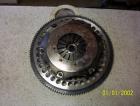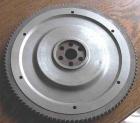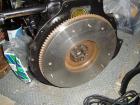| Revision as of 06:35, 12 January 2008 Ddgonzal (Talk | contribs) (->Lightening) <- Previous diff |
Revision as of 06:45, 21 April 2008 Ddgonzal (Talk | contribs) Next diff -> |
||
| Line 1: | Line 1: | ||
| - | Datsun 1200 uses a traditional type of flywheel at the back of the engine. The face matches the [[Clutch]] while a ring gear is attached to the perimeter for the [[Starting Motor]] to turn the engine. | + | Datsun 1200 uses a traditional type of flywheel at the back of the engine. The face matches the [[Clutch]] while a ring gear is attached to the perimeter for the [[Starting Motor]] to turn the engine. It uses a 105-tooth ring gear. |
Revision as of 06:45, 21 April 2008
Datsun 1200 uses a traditional type of flywheel at the back of the engine. The face matches the Clutch while a ring gear is attached to the perimeter for the Starting Motor to turn the engine. It uses a 105-tooth ring gear.
All flywheels for A-series engines interchange -- for rear-wheel drive vehicles. The A12 flywheel weighs a bit less is the main difference.
- A12: 9.7 kg (PN 12310-H1000)
- A12: 6.4 kg (Race Option flywheel PN 12310-H2310]
In 1974 flywheel bolts changed from British Threads to Metric threads. So the bolts are not interchangeable from early to late.
Lightening
For race cars, a light flywheel allows the engine to rev faster according to this principle:
The more weight, the more time it takes to accelerate
Now a street car wants a heavier flywheel, so that it will:
- smooth out the combustion pulses
- smooth out the drivetrain
These are the factory specs for flywheel weight reduction:
Finished wheight is about 6.5 kgs --a total of 2 kgs removal
Reference: Datsun B110 Competition Tune-Up Manual, Nissan Motor Co. Ltd., Tokyo Japan 1974

![[Datsun 1200 encyclopedia]](/wiki/upload/wiki.png)















